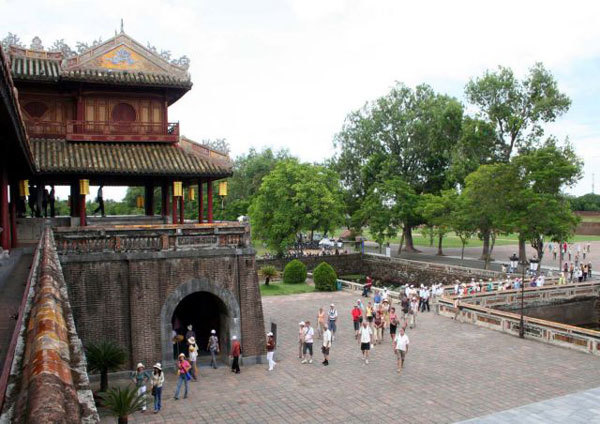 |
The 80-year-old was speaking at a conference during the Vietnam National Film Festival (VNNFF) in the coastal province of Ba Ria – Vung Tau.
"This is the first time I come to Vietnam but I have researched much about your film industry. I know that famous filmmakers have come to make films in Vietnam," he said.
"Commercial films are popular at Vietnamese cinemas to serve the entertainment demand of audience who are mostly young people, but it's time to make more art-house films. Vietnam has many suitable backgrounds for this genre."
The conference drew many local and foreign filmmakers. They discussed the potential for filming in Vietnam, obstacles and ways to welcome more foreign film crews to the country.
In recent years, Vietnam has become a destination for foreign filmmakers to make feature films and advertisements, most notably Kong: Skull Island (2017) directed by Jordan Vogt-Roberts.
Many localities that were chosen to shoot films have become destinations for local and foreign tourists such as Ha Long Bay (Quang Ninh Province), Phong Nha – Ke Bang National Park (Quang Binh Province) and Trang An Complex (Ninh Binh Province).
“An ancient house of the Mong people in Sung La Valley became famous after the success at local and international film festivals of Chuyện Của Pao (Pao’s Story) directed by Ngo Quang Hai, now the house is a must-see destination for tourists in the mountainous province of Ha Giang,” said Nguyen Thu Ha, vice director of the Cinema Department.
“We believe films help promote image of the country effectively and develop the cultural environment,” she said.
“We acknowledge the role of cinema industry and hope the experts will deliver some solutions to attract more foreign film crews to come to shoot in Vietnam.”
 |
Solutions to help
Entertainment companies always look to create content for global audiences and that means creators have to find locations around the world, according to James Cheatley, Regional Director of the Motion Picture Association International (MPA) in Asia Pacific.
“We all understand that productions bring significant expenditure on labour, goods and services in locations. Other benefits include increased tourism and soft power projection.”
Cheatley said Vietnam is well placed to take advantage of global expenditure on content, with varied topography, beautiful beaches, mountains and jungles as well as large cities.
“However these things alone may not be enough to bring expenditure to Vietnam,” he said.
“To take things to the next level, Vietnam needs production incentives namely cash rebate and tax credit; available infrastructure and services; local cast crews and equipment; a film-friendly production environment, and marketing strategy,” said Cheatley.
“Another issue is film permits, the production will need a clear understanding of the film permitting process across all governments. For example, can the production shut down a street in Hanoi to film?” he asked.
He said Vietnam has a great opportunity to attract large-scale productions with the right incentives.
Production designer Lee Ha-jun of Cannes-crowned Parasite (2019) suggested filmmakers should transfer the film’s message, metaphor and characters’ attitude by selecting locations.
“Locations and different angles of camera can reveal many things about the film and create the atmosphere for the film,” he said.
“In Parasite, we gave priority to finding natural locations with suitable light, landscape and settings. Filmmakers should find new locations and angles to bring freshness for the film,” he said.
“To make a residential area for rich people, we chose a location on the hill which is high, dry and brilliant while houses of the poor were set up in the small alleys in Seoul. These spaces are narrow, wet and stuffy creating the pressing and sultry atmosphere for the film.”
“The clear contrast between these places helped make psychological effects for audiences,” said Lee.
Lee said Vietnam has big potential in making films and he will take advantage of this trip to Vietnam to scout out filming locations. VNS
Minh Thu

Vietnamese film industry begins to diversify, and thrive
By paying heed to directors on TV and in print media, Le Hong Lam, a prominent film journalist, gained a deeper understanding of the film world.

Film fest to spread national identity, humanity, integration
The biggest event of the national cinema industry will be held on November 23-27 in Vung Tau City, southern province of Ba Ria–Vung Tau.

How to make Hue City a real film studio
The central city of Hue is potentially a giant film studio amid a widespread lack of locations for shooting historical movies.
 Vietnam is home to a lot of beautiful landscapes with the potential to be gorgeous backdrops to movies, Polish director and producer Krzysztof Zanussi said during a conference on Sunday.
Vietnam is home to a lot of beautiful landscapes with the potential to be gorgeous backdrops to movies, Polish director and producer Krzysztof Zanussi said during a conference on Sunday.